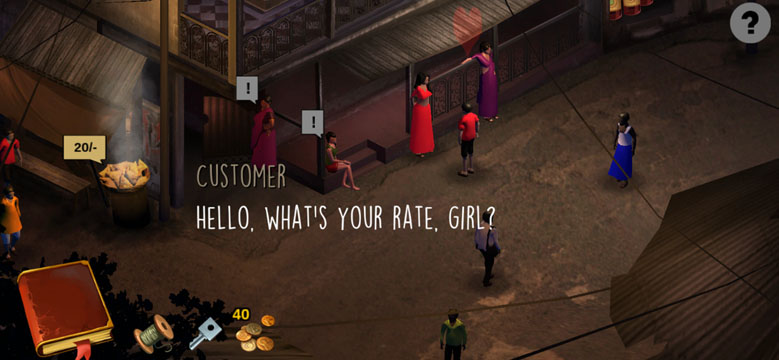Thousands of girls get lost into the black hole of trafficking. There are over 3 million prostituted women in India, out of which 1.2 million are young girls. The average age of recruitment of girls into prostitution is between 9 and 12 years of age.
Imagine playing an interactive game on the same lines. The design of MISSING Game App allows players to experience what a missing person goes through when she is trafficked into the inhumane and cruel world of prostitution, a world into which millions of girls are lost every year. It exposes the player to the dark world of human trafficking and raise awareness about it. Players assume the role of the missing person, making choices and assessing risks for themselves to find their way to the illusive freedom.
It combines the gaming experience with the issue of trafficking and enabling it to reach pan India with the availability in Marathi, Malayalam, Kannada, Punjabi, Telugu, Gujrati, Mathili and Tamil, in addition to English, Hindi and Bengali.
According to the Sex Watch Survey, 87.6% of Indians have viewed porn atleast once in their lives with almost 40% continuing to consume it weekly. Internet (77.7%) has been the most used platform and a majority (64%) used mobiles to access porn material. While curiosity (64.7%) did play a key role in searching for porn, a relatively large number (24.7%) got exposed to it by accident. The survey delved deeper and found insights like 71% of Indians are aware or suspect that their spouses consume porn but at the same time 68% admitted that they would avoid watching it with their partners.
There is a growing increase in the lack of awareness of laws against pornography. Internationally, Sweden is the first country in the world to criminalise the purchase, and not the selling, of sexual services in 1999. The goal is to address the demand side of the equation and trafficking for commercial or sexual purposes. Rather than putting the emotionally and physically imperiled exploited person behind bars, the trafficked person is considered a victim. The ban on purchase of sexual services is intended to bring about a fundamental shift in societal attitudes.
Consul General of Sweden, Ulrika Sundberg says, “Among the root causes for human trafficking is poverty, lack of economic opportunities and absence of social safety nets and redistribution of wealth. Exploitation is further fueled by corruption, gender discrimination, harmful traditional and cultural practices, natural disasters, civil unrest and lack of political will to end it. Trafficking is a modern form of slavery and children and women are exploited in ways more than one like forced labour, sexual exploitation, domestic servitude, camel jockeys, criminal activity such as pick pocketing, begging, transporting drugs amongst others. Since 2000, human trafficking is an international crime and criminalised at the national level.”
Back home, the awareness needs to increase on a large scale through open and detailed conversations in schools and rural India. The stigma attached to the victim presents a huge obstacle to their rehabilitation. In order to overcome the trauma of their experience from trafficking, psychological and other forms of support from the society, family and the larger community is crucial. Simultaneously, sensitisation and a broad knowledge base are crucial to raise awareness across society.
Thank you for reading the story until the very end. We appreciate the time you have given us. In addition, your thoughts and inputs will genuinely make a difference to us. Please do drop in a line and help us do better.
Regards,
The CSR Journal Team


